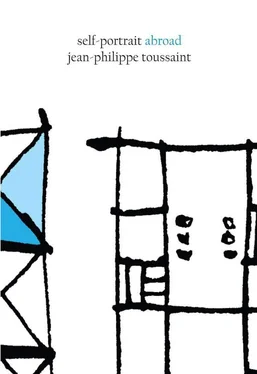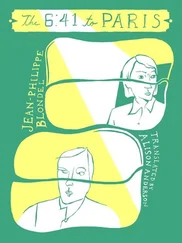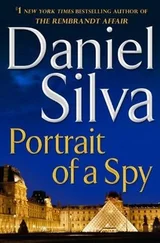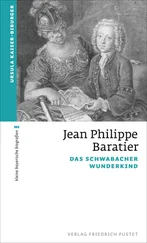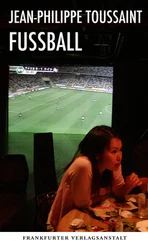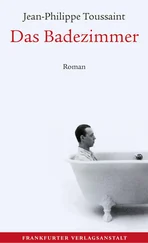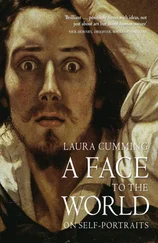Jean-Philippe Toussaint - Self-Portrait Abroad
Здесь есть возможность читать онлайн «Jean-Philippe Toussaint - Self-Portrait Abroad» весь текст электронной книги совершенно бесплатно (целиком полную версию без сокращений). В некоторых случаях можно слушать аудио, скачать через торрент в формате fb2 и присутствует краткое содержание. Год выпуска: 2010, Издательство: Dalkey Archive Press, Жанр: Современная проза, на английском языке. Описание произведения, (предисловие) а так же отзывы посетителей доступны на портале библиотеки ЛибКат.
- Название:Self-Portrait Abroad
- Автор:
- Издательство:Dalkey Archive Press
- Жанр:
- Год:2010
- ISBN:нет данных
- Рейтинг книги:3 / 5. Голосов: 1
-
Избранное:Добавить в избранное
- Отзывы:
-
Ваша оценка:
- 60
- 1
- 2
- 3
- 4
- 5
Self-Portrait Abroad: краткое содержание, описание и аннотация
Предлагаем к чтению аннотацию, описание, краткое содержание или предисловие (зависит от того, что написал сам автор книги «Self-Portrait Abroad»). Если вы не нашли необходимую информацию о книге — напишите в комментариях, мы постараемся отыскать её.
, our narrator — a Belgian author much like Toussaint himself — travels the globe, finding the mundane blended everywhere with the exotic: With his usual poker face, he keeps up on Corsican gossip in Tokyo and has a battle of nerves in a butcher shop in Berlin; he wins a boules tournament in Cap Corse, takes in a strip club in Japan’s historic Nara, gets pulled through Hanoi on a cycle rickshaw, and has a chance encounter on the road from Tunis to Sfax. Tales of a cosmopolitan at home in a strangely familiar world,
casts the entire globe in a cool but playful light, reminding us that, wherever we go,we take our own eyes with us…
Self-Portrait Abroad — читать онлайн бесплатно полную книгу (весь текст) целиком
Ниже представлен текст книги, разбитый по страницам. Система сохранения места последней прочитанной страницы, позволяет с удобством читать онлайн бесплатно книгу «Self-Portrait Abroad», без необходимости каждый раз заново искать на чём Вы остановились. Поставьте закладку, и сможете в любой момент перейти на страницу, на которой закончили чтение.
Интервал:
Закладка:
Once we’d finished lunch we lost no time in loading the pétanque balls into the trunk of the 4x4, when what I at first took for a couple of particularly brazen Italian tourists pulled up and parked their Vespa right in front of the terrace, practically where we were standing. Seated on the back of the motorcycle, whose exhaust pipe continued to bang and spit out a nasty-smelling little cloud of black smoke around our legs, sat a Japanese woman dressed in a large white tank top that all but revealed the naked curve of her breasts, a Japanese woman who, not seeming at all ready to dismount, remained seated on the back of the scooter looking every bit like some hitherto unclassified mythological creature (neither siren nor seahorse: the top half a Japanese woman and the bottom half a scooter), carefully holding a bright yellow surfboard under her arm. It was only the rather uncustomary presence of this Japanese woman on the back of the motorcycle that stopped me from immediately recognizing the driver. Getting off with calm assurance he propped the Vespa on its stand and took off his sunglasses in a Hollywood-like gesture: Christian Pietrantoni. Dressed in a flowery shirt, Bermuda shorts, and long, vaguely Austrian spotted white woolen socks pulled up to his knees (attire that contrasted somewhat with the austere gray suit and small round glasses he’d been wearing the last time I’d seen him in Tokyo), he introduced us to Noriko, who’d just got off the scooter, effectively delaying our departure for the boules tournament. I served them a well-cooled glass of Orenga rosé on the terrace while Christian Pietrantoni spent the entire conversation pulling up his Tyrolean socks and leaning over to his friend to exchange a few loud words with her in Spanish, the only language they both understood, she having spent several years in Madrid (the same years I had, in fact, I learned to my surprise: ¡hombre, en el ano noventa! said the Japanese woman, ¡Yo tambien! ). Christian Pietrantoni had for his part been posted to London at the time, which probably had no connection with his excellent knowledge of Castilian. Ange knew Christian Pietrantoni too of course, Ange knew everyone. I’d even heard that when Ange’s parents came to visit him in Tokyo (Ange had also lived in Japan for a bit: “Really, these Corsicans are everywhere,” the Japanese woman must have thought), Christian Pietrantoni, immediately filled-in about their arrival by some well-informed snitch or another (Ange himself probably), had swooped down on their hotel with all the swiftness of a predator and all the doting attention of a Lithuanian cousin to serve as their guide and companion, leading them through the narrow streets of Shinjuku and telling them about the country while bringing himself up to date on the latest news from the village, the most recent putachji from Centuri, Morsiglia, or the hamlet of Minerviu. I glanced discretely at the time and, not wanting to be late for the boules match, abruptly signaled our departure by impetuously clacking my pétanque balls together the way the great players do, making Noriko jump in her seat ( ¡santo cielo! she cried, putting a hand to her chest).
We headed off. Taking our seats in the different vehicles we drove over to Tollare in a slow, motorized procession, Christian Pietrantoni’s little Vespa leading the way through the silent and burning scrubland, while we boules players followed in Ange’s 4x4 without speaking a word, like astronauts with less than an hour before takeoff. In front of us Christian Pietrantoni swerved his Vespa along the sinuous bends in the road like a motorcycle escort, swaying back and forth with the curves. Behind him, Noriko was clutching the multicolored shirt of her knight errant in one hand and her yellow surfboard in the other, like some profane trophy she was parading from one village to the next in honor of the ocean and its enormous waves (even if the Mediterranean was calm as a lake that day, with just a few little waves perishing humbly against the rocks down below). When we got to Tollare we parked on the large gravel lot and I walked down to the beach to sign us up for the tournament. In a little shack surrounded by reeds where you could buy ice cream and a few soft drinks, a table had been set up under a parasol and two guys in shorts (the organizers) signed the players in before starting the draw. Reaching my hand deep into the pocket of my Bermuda shorts I took out a crumpled old fifty franc note displaying a wizened, grinning Voltaire, and gave our names to the organizers. They just took down our first names, Ange, Jean-Philippe, Jean-Michel (Vilmouth’s first name is not Jean-Michel, by the way, but Jean-Luc, everyone knows that; no matter, later I astutely made up for my slip by telling him I’d invented the pseudonym to help him save face once people had seen him point). When it was finally time for the draw with its unchanging ritual of little scraps of paper mixed together in a cotton sunhat sporting the Pastis 51 emblem, luck had it that my partner was a certain René. Our team was rather unbalanced, I must say, you couldn’t have imagined a more disparate, morganatic pair. René, short and stocky, densely muscled, with a thin black moustache, red shorts, and some old slippers (he could even have gone shirtless), was the infallible shooter, while I, long-limbed and aristocratic (very Prince of Savoie, I’d been told), had the fine long hands of a levelheaded pointer, legs looking rather white compared with my partner’s hairy brown stumps (though, as far as I was concerned, my legs were already ideally tanned), silhouette slightly hunched by the weight of my years and with a hint of lukewarm disdain about it, thanks to the daily exercise of irony. I was wearing a simple baggy pair of beach trunks and a loose white cotton shirt, a light-colored straw hat that fit me like a glove — an elegant yellow straw boater garnished with a fine caramel ribbon that must have belonged to my grandfather Lanskoronskis — and a pair of what are known as boat shoes, the sort worn by indolent rich amateur sailors who idle away their time on yacht-club gangways (you can imagine the sort of figure I cut: people called me Monsieur). After the first game, which of course we won without difficulty, we returned to the shack to announce our rapid victory to the organizers. The other games were still in progress, only one had already ended, apparently without much of a fight, I could see Jean-Luc (disguised as Jean-Michel, three pétanque boules scattered around his feet) leaning on a white plastic chair on the terrace, his pant legs rolled up around his calves, standing there in bare feet gazing out at the sea. And? I asked him. Thirteen to zero, he said, and lazily tossed a pebble into the water that, like him, succumbed, dropping slowly to the bottom, two arm’s lengths from where Noriko was paddling, her surfboard wedged under her arms, slowly advancing over the water, kicking her legs recklessly behind her in the blue, desperately still sea.
Ange and I both made it easily to the semi-finals and I must say that, seeing us fighting out the tournament’s two semi-finals just a few meters apart, each with a different partner (who, although not our regular partners, no doubt gave us better odds), it struck me we were heading straight for a fratricidal confrontation in the finals. Things didn’t turn out that way (and this isn’t the place for me to explain the reasons for Ange’s early defeat). When it came to the finals, crouching down in the circle to point, concentrating, my panama on my head, my shoes covered with a fine coating of gravel dust, I noticed that a small crowd had gathered on the main square of the village, and was looking on attentively. My boule in my hand, now completely immersed, my eyes intense, I sized up the distance separating my boule from the jack and gave myself mental pointers like, “Don’t throw it too short now” (because I tend to be short — in boules that is). Taking one last look at my target, slightly to the left of the natural axis of the slope, and tracing one last time in my mind the entire trajectory of my boule, I finally straightened in the circle, almost in slow motion, and, in the same all-embracing synchronous movement, I lifted my arm and let go of the boule with a final, minutely calculated rotational twist of the wrist. It was short, damn it, I could see it right away. Point another, go on, said René, violently clacking his two boules together to calm his nerves (and perhaps so as not to take his disappointment out on me in a more physical manner). I crouched back down in the circle. From time to time I recognized a few familiar voices in the vague noise of the crowd. Yo qué el hubiera saccado , Noriko was saying. Cres aue va a apuntar otra vez? she added. Callate, lo vas a descentrar , answered Christian Pietrantoni. Not able to concentrate, in fact, I didn’t play right away and got up to have another look at the position of the balls, dropping my boule vertically onto the ground to calculate the resistance of the terrain. Not too short, hmm? said René. No, no, I saw, I saw, I said. I went back to the circle and pointed (I was long, a hair long). At the end of the game, on the last throw, our opponents were leading eleven to nine and the fate of the game hung in the balance. I had the chance to shoot for the win and put all four of our balls closest to the jack. You gotta shoot, said René, you gotta shoot, it’s all or nothing. Though I always concentrate for a long time before pointing, I generally shoot by instinct. I went up to the circle and without a moment’s reflection shot and…knocked their boule from the center. And my boule stayed put. There was a moment of hesitation in the square, murmurs, a buzz of voices, the score was counted. Nine plus four: thirteen. Thirteen, we’d won the competition (the first prize was a Corsican ham, a prizuttu ). A vague stir started up around me, people came up on all sides to offer their congratulations, my son jumped up and down for joy, Madeleine ran over to me with our baby Anna in her arms, who uttered her first words on the spot in a burst of enthusiasm (either “papa” or “ prizuttu ” no one was really sure in the confusion). The organizers then awarded me the first prize of the competition, the Corsican ham. Moved, I took it in both hands and brought it to my lips before holding it up at arm’s length to the crowd while shots were fired and bells rang out all around the village. I then passed the ham to my partner and he kissed it in turn, rubbing it against his moustache, and, in the general hubbub, with Noriko trotting alongside and holding out her surfboard for me to autograph, we did a little victory march around the village square, followed by a limping dog and a couple of kids.
Читать дальшеИнтервал:
Закладка:
Похожие книги на «Self-Portrait Abroad»
Представляем Вашему вниманию похожие книги на «Self-Portrait Abroad» списком для выбора. Мы отобрали схожую по названию и смыслу литературу в надежде предоставить читателям больше вариантов отыскать новые, интересные, ещё непрочитанные произведения.
Обсуждение, отзывы о книге «Self-Portrait Abroad» и просто собственные мнения читателей. Оставьте ваши комментарии, напишите, что Вы думаете о произведении, его смысле или главных героях. Укажите что конкретно понравилось, а что нет, и почему Вы так считаете.
